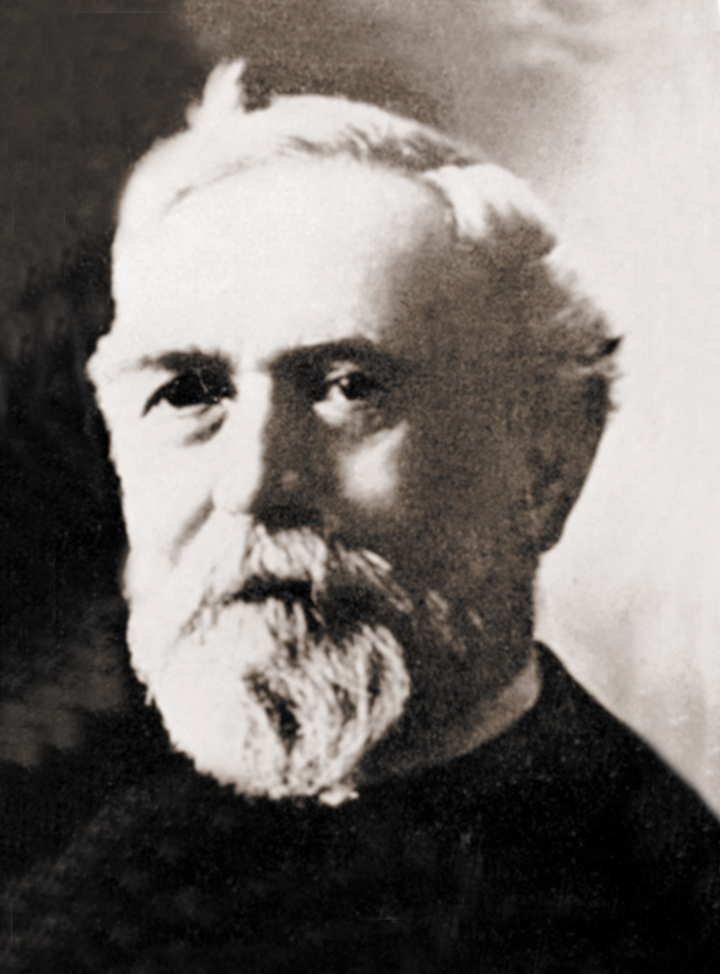By James E. Casto
HQ 44 | SPRING 2002
Huntingtonians are sometimes surprised to learn that the city’s founder, Collis P. Huntington, never lived in his namesake city. Truth is, the founding of Huntington was little more than a brief episode in the famed rail tycoon’s crowded life. With Huntington himself so seldom on the scene, it fell to his brother-in-law, Delos W. Emmons, to translate his dream into reality.
Born into poverty, Huntington started out in business as a common peddler, walking from farm to farm in his native Connecticut, selling what he could carry in two leather knapsacks slung over his shoulders. When gold was discovered in California in 1848, he was one of the many who rushed westward, and it was in California that he made his first fortune – not by mining gold, but by selling supplies to the miners.
Huntington was one of the builders of the Central Pacific, the western link in the long-dreamed-of transcontinental railroad, and he and his partners went on to build the even larger Southern Pacific. He developed the Virginia city of Newport News, founded the giant Newport News Shipyard and had extensive other business interests. On his death in 1900, he’s said to have been worth $75 million. Allowing for inflation, that surely would make him a billionaire in today’s dollars.
His far-flung business affairs required that Huntington spend weeks or even months at a time in California, New York, Washington, D.C. and other cities. That meant, since he could spend so little time in his new town, he needed somebody to be in charge in his absence. Somebody who could be his trusted righthand man. Huntington found that man in Emmons.
When Huntington bought a controlling interest in the Chesapeake & Ohio Railway in 1869, many (including his Central Pacific partners) scoffed at his purchase. The C&O, they pointed out, was little more than a few miles of Virginia track and a rag-tag collection of rolling stock. But the canny Huntington knew that if tracks could be laid across the then-new state of West Virginia, the C&O could connect there with the Ohio’s steamboats and open it up as an important artery of commerce.
Huntington rejected the overtures of several small Ohio River communities eager to welcome the railroad. Instead, he picked out a stretch of farmland on the Ohio just downstream from the mouth of the Guyandotte River, and there he commenced building a new town. Or, more accurately, he put his brother-in-law in charge of building his namesake city.
In his biography of Huntington, “The Great Persuader”, historian David Lavender describes what transpired: “Through agents, Huntington quietly purchased some 5,000 acres, formed the Central Land Company, put Emmons in charge, and on February 27, 1871, incorporated the town of Huntington, West Virginia. To ensure instant population, he and Emmons placed the C&O shops inside the city limits and built two rows of houses to rent to employees.”
Emmons, born in Oneonta, New York, on December 17, 1828, had married Huntington’s sister Mary. He and Mary, with their five children, traveled down the Ohio River by steamboat, landed at the wharf in Guyandotte and briefly took up residence there while he pushed Huntington’s plans forward.
In 1871, in his capacity as general manager of the Central Land Company (a post he would hold until 1888), Emmons oversaw the first sale of lots in the new town. Later that same year he was elected a member of Huntington’s first city council.
As a council member in 1872, Emmons served on a committee for the building of the city’s first two public schools and the same year saw him elected a director of the newly organized Bank of Huntington.
He bought the old Thomas Buffington home on the Ohio River just below the mouth of the Guyandotte, remodeling it and naming it “Pleasant View.” There he and his wife entertained friends and business associates. And it was there, too, that C.P. Huntington made his headquarters during his infrequent visits.
Painted a bright yellow, Pleasant View was surrounded by 15 acres of land on which stood elaborate horse and cattle barns. It’s said that many mornings when Emmons climbed into his buggy and set off for his office, he carried with him a dozen eggs, a pound of country butter or a can of buttermilk which he would give away to the first likely soul he met along the way.
All five of the Emmons’ children were born before they came to West Virginia. Of the five, three would go on to play important roles in the growth and development of Huntington: Arthur S. Emmons became Huntington’s first city clerk, and much later, in 1912, built the Emmons Apartments at Third Avenue and 12th Street.
J. Alden “Ollie” Emmons ran a furniture factory, and in 1890 was elected an of ficer of the Huntington Board of Trade, a predecessor of the Huntington Regional Chamber of Commerce.
And Carleton D. Emmons, in partnership with J.L. Hawkins, established the Emmons-Hawkins Hardware Company in 1891, for many years the largest wholesale hardware company in West Virginia. (Long a landmark on Third Avenue in downtown Huntington, the old hardware firm closed its doors in 1971.)
If Delos Emmons exhibited any reluctance to accept his brother-inlaw’s invitation to be his personal agent in the new town of Huntington, local history doesn’t record it. Of course, Huntington had a reputation for being stubborn, highhanded and, one way or another, almost always getting what he wanted. Thus, his “invitation” to Emmons may, in fact, have been more of a command.
In any event, Emmons put down deep roots in Huntington and would be one of the community’s leading citizens until his death on April 19, 1905.





